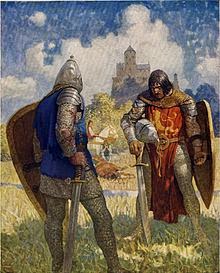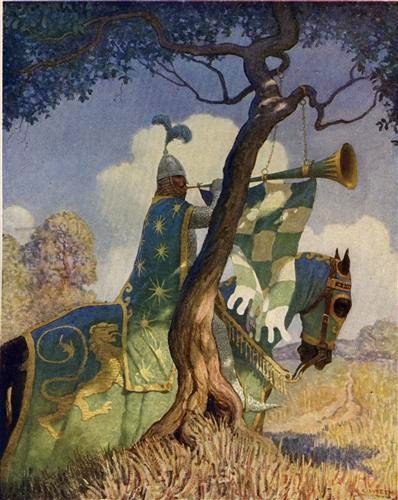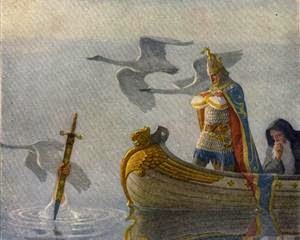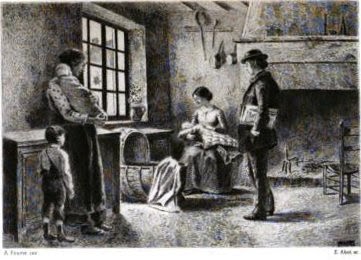Books VI through IX
Okay, this book just keeps getting stranger and stranger. In this section, the reader first gets the honour of following Lancelot on his journeys. We have more incidents of kidnapped knights, devious damsels, murderous giants, prison escapes and vengeance. It always amazes me that these knights can be in the middle of a fight to the death but still manage to hold polite conversation with one another. I’m still unclear as to the chivalric rules of when you kill a knight and when you let him live. Do you only let him live if he’s honourable? What if he’s honourable, yet he’s offended you? I’m not sure. And why, for heaven’s sake, do Knights of the Round Table fight each other? Because there’s no one else handy? Well, back to Lancelot …… our trusty knight further spent his time cutting cloth and stealing swords from corpses; refusing to kiss ladies who perished from their sorrow, and suffered foiled attempts at rescuing ladies from their murderous husbands who finally manage to lop off their heads. Ay me, what fun!
 |
| Lancelot du Lac N.C. Wyeth source Wikiart |
Beaumains arrives at court and has a fight with the greatest knight Sir Lancelot. He nearly defeats Lancelot and only gives over when Lancelot promises to knight him. He does this without Arthur’s knowledge, nor does he reveal that Sir Beaumains is actually Sir Gareth, the younger brother of Gawaine and Gaheris. I have given up asking why in this book.
Sir Beaumains, with his hidden identity, proceeds to have his own adventures, attaching himself to a maiden who want nothing to do with him, and defeating everyone he meets. Thankfully there is little killing, all due to the maiden who pleads for his rivals’ lives. But, good gracious, does she have a tongue on her! She abuses and belittles him at every opportunity, yet Beaumains will only confess that Linet’s debasement of him makes him fight better. O-kay ……
 |
| Sir Gareth source |
Eventually Beaumains announces that he loves the lady’s sister, Liones, which doesn’t seem to bother Linet, but apparently the lack of knowledge of Beaumains’ identity does bother them, so, with their brother’s help, they decide to steal his dwarf. That’s right. Beaumains’ dwarf. Why they didn’t just ask Beaumains who he was, remains a mystery. Well, our good Beaumains arrives at the castle to demand the return of his dwarf and the culprits comply since they have discovered that Beaumains is Gareth, son of a king and nephew to King Arthur. The sparks fly between Liones and Gareth and they pledge their love to each other. Are you with me? Good, because it gets better …… or worse, as the case may be …….. That night while sleeping in the hall on a couch (apparently knights need no better sleeping arrangements) a mysterious knight appears, he does battle with Gareth, and Gareth, even though severely wounded in the thigh, lops off his opponents head. Disgusting, yes, but there’s more.
 |
| The Green Knight preparing to battle Sir Beaumains N.C. Wyeth source Wikiart |
The lady Liones arrives, then her brother, but when Linet appears she immediately plucks up the head, smothers it with ointment, does the same to the neck, and then sticks the two together, whereupon the knight pops up and Linet takes him to her chamber. Enough, right? Malory could not possibly continue the comedy. But he does. The next night, the knight with the re-attached head attacks again and this time Gareth takes no chances. Once again, beheading him, he chops the head into hundreds of pieces and tosses his fleshy confetti out of the window. Does this faze Linet? Not one bit; she runs outside, gathers up the pieces and once again, by some sort of sorcery, re-assembles the hacked up knight. One wonders what would happen if she missed a piece …….. In any case, does this sound like a family you would want to marry into? Well, Gareth does eventually marry the Lady Liones. I guess it could come in handy having a healing sorceress as a sister-in-law. As to the benefits of a rouge dwarf-stealing brother-in-law, I’m not sure …….
 |
| Tristram and Isolde N.C. Wyeth source Wikiart |
Sir Tristram is also introduced to the reader in the last book and we learn of his love for La Belle Isould. Again, it’s rather confusing and this post is getting long so we’ll perhaps save their shenanigans for next time!
So, all in all, an interesting read and I must say I’m enjoying it better than when I started. My favourite story of this section is, as you can tell, the story of Sir Gareth. My favourite name? Definitely King Anguish of Ireland. His name brings a sort of brotherly emotion to the spirit of the read!





















